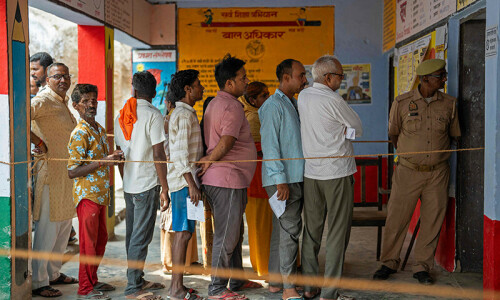CANBERRA, March 1: Top World Health Organisation officials and Muslim leaders will meet in Egypt next week in an effort to stop attacks on polio workers, which are hampering the eradication of the virus in some countries with large Muslim populations.
“Shooting health workers who are protecting kids from this crippling disease is against the (teachings of holy) Quran and everything Islam stands for,” WHO’s Assistant Director-General Bruce Aylward said here on Friday.
Gunmen in Pakistan and Nigeria have killed more than 20 health workers in the past three months in a series of attacks linked to a backlash against the immunisation programme.
“Muslim leaders have been great advocates of immunisation and generally the support has always been there. In Cairo, we are meeting senior Islamic leaders to get a sense of what we can do, and ask them how can you help us,” said Mr Aylward.
The WHO has successfully eliminated polio from most nations after a 25-year campaign, but the crippling condition remains endemic in Afghanistan, Pakistan and Nigeria, where some clerics have opposed the programme as a western conspiracy.
WHO remains on target to eradicate polio globally by 2018, Mr Aylward said, despite a violent backlash from militant groups in Pakistan and Nigeria.
But there are also worrying signs of persistence, with the polio virus found in sewers in Cairo in January, with the type linked to the indigenous strain in Pakistan. Egypt has not had a case of polio since 2004.
Mr Aylward said violence had forced the WHO to revise its approach to immunisations in both Pakistan and Nigeria. “The goal is to put tools in the hands of the communities to immunise their own kids,” he said. “The overall risks (of contracting polio) are getting smaller, because we are finally getting into some of these difficult places.”
Since 1988, the WHO has cut the number of global polio cases from 350,000 to just 225 in 2012, with India declared polio free in January 2012. Last year, Pakistan reported 58 polio cases.
Mr Aylward said the WHO was working to reduce risk factors for those involved in work to tackle the crippling illness in countries such as Pakistan.
“It’s a horrible tragedy. As you can imagine, it’s something very personal, the pain you feel for families that lose people in the course of a programme that you are actually the head of,” he said.
“(But) every time it does happen... invariably the people come back and say to us `this makes finishing that much more important’.”
The Taliban in Pakistan last year banned polio vaccinations in some tribal areas, alleging it was a cover for espionage. Rumours about vaccines being a plot to sterilise Muslims have also dogged efforts to tackle the highly infectious disease in the country.—Agencies












































Dear visitor, the comments section is undergoing an overhaul and will return soon.